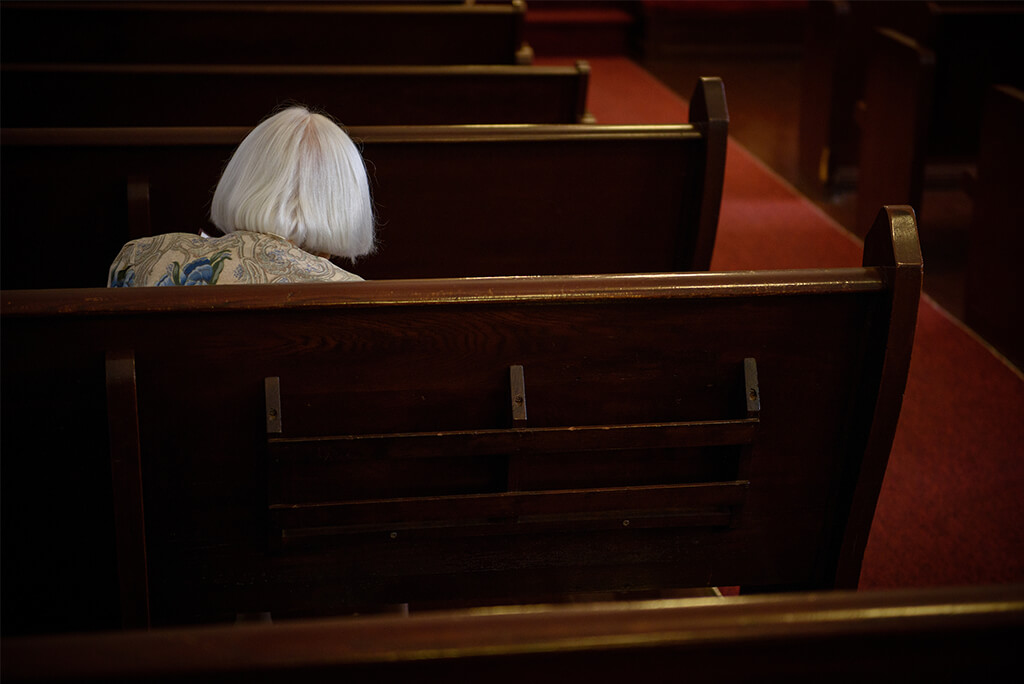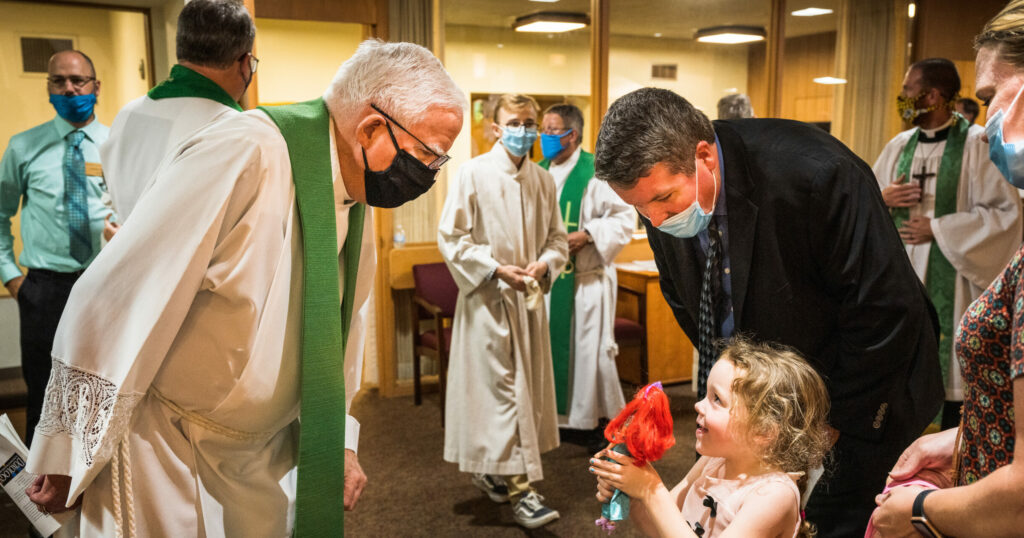by Matthew Richard
Perhaps one of the most difficult things to do as Christians is to deal with one another during conflict or sin. Tragically, if Christians were to be graded on this, in many cases we would see that we have failed. Don’t get me wrong, the world messes this up quite badly, too. But as Christians, we have clear testimony in Scripture about how we should deal with these matters. It is worthwhile to remind ourselves of Scripture’s counsel regularly.
If someone offends you, it is important to first pause and examine whether you have actually been sinned against. Just because your feelings are hurt or you are offended, it doesn’t necessarily mean that you have been sinned against. Sometimes, the truth hurts.
However, if you have indeed been sinned against by another Christian, what should you do? Perhaps you are able to lay the offense on Christ’s cross, knowing that love covers a multitude of sins. Perhaps you find yourself able to put the best construction on that fellow Christian and continue to love them in the name of Jesus. If so, then God be praised. However, perhaps the sin against you has really dug deep and wounded you greatly, or the sin or harm is ongoing. What then?
Jesus is straightforward in explaining this in Matthew 18:15–20: If a fellow believer hurts you, go and tell them, work it out between the two of you.
Our sinful nature often leads us to at least two different responses. Firstly, instead of working the problem out with them directly, we often take the problem to others first. But if you go and tell a bunch of other people rather than going to the offender first, then you are just as guilty as they are. Think of it this way: When a sin happens between two people, it is a private sin. But if you go and tell a bunch of other people about the sin, you are taking something private and making it public without giving the other person an opportunity to privately apologize for it. By doing so, you are breaking the Eighth Commandment of bearing false witness.
A second sinful response is, instead of seeking resolution, to “play the victim.” Now, please hear me clearly: You may very well be a victim. But if, instead of seeking resolution and restoration with the person who has wronged you, you choose to hang your head low or walk around with a chip on your shoulder — trying to draw attention to yourself or to shame the other person — that is not following the Word of Jesus. That is to focus on and play up the wrong, rather than seeking forgiveness and restoration.
Now, let’s just say that you do talk to the person, and they won’t listen — they remain hardened and unrepentant. Then what? Well, if they do not listen, Jesus says to meet again, this time bringing one or two others along as witnesses. If restoration is achieved then, God be praised. However, if restoration is not achieved — if the person still doesn’t listen — then you and the witnesses are to tell the church, and the church will then admonish unto restoration, even to the point of casting them out if they will not repent (see Matt. 18:15–20 again).
But what if a sin happens publicly? I can remember many years ago, when I was a very, very young pastor, I was in a voters’ meeting and things got ugly. A member publicly attacked the senior pastor. He yelled, slammed his chair down, walked out of the fellowship hall and slammed the doors. Later that week, the senior pastor met up with the man, and they worked things out. Apologies were given and received. Forgiveness was applied. However, nothing was stated publicly. And so, everyone was holding their breath at the next voters’ meeting. The public sin was not publicly shown as reconciled.
I can remember another instance: A pastor became unhinged at a conference and attacked a bunch of other pastors ruthlessly. After the conference session, nobody wanted to confront the pastor because, well … that is just how he is. And so, this angry pastor alienated himself from others even more that day, isolating himself in his anger.
The point is this: We fail miserably when public sin is not reconciled publicly. (For dealing with public sin, see 1 Timothy 5:10 and Acts 16:37.)
Dear friends, we Christians often don’t deal with private sins privately but drag them into the public sphere. And we often fail to deal with public sins publicly, but sweep them under the rug or manage them behind the scenes.
In Galatians 6:1, the apostle Paul addresses another instance of sin in the congregation: when a Christian is trapped in a sin. Paul discusses the Christian in the church whose passions get the better of him. In the passage, Paul stresses that fellow Christians should not turn a blind eye, shake our heads with shame or act as if we are morally superior, but instead humbly and kindly bring our fallen brother or sister back to wholeness.
However, Paul also speaks a warning: A mature Christian should not snub or look down upon another caught in sin, or use that person’s failures to make himself feel better (Gal. 6:4–5). Instead, Christians who walk by the Spirit ought to gently and humbly help others ensnared in sin, knowing that the next time, it might be them ensnared. When a Christian realizes that the sins of their brothers and sisters are a danger to them as well, they then can treat their fallen brothers and sisters with gentleness and kindness while seeking to restore them in Christ.
This is a difficult topic. When we offend one another as Christians or are unexpectedly caught up in sin, it is not a small matter. During these difficult situations, if we Christians do not handle ourselves with humility, gentleness, integrity, love and forgiveness, people may find themselves estranged from the church with fractured faith, just as the devil desires. Keep in mind that in the church, our primary battle is not with other Christians but with the devil and his demons. The battle is with the sin that is in all of us, according to our old Adam.
And so, we are in this together under the grace of God. Each of us, as Christians, endures the same hard world, the same foul devil, the same stubborn old Adam. And yet, each of us has been forgiven, redeemed and claimed by God through Christ. And so, we walk in Jesus always being for each other — no matter the sin and no matter the conflict. Since we are in this together, we seek restoration and forgiveness at every opportunity. Indeed, because of Jesus, we share each other’s burdens; we are quick to confess and quick to forgive. Because there is more grace in Jesus than there is sin in us, we must not grow weary of doing good and extending grace and forgiveness to each other.
Photo: Stained glass at Risen Savior Lutheran Church depicting Nathan rebuking David (2 Samuel 12), on Sunday, March 31, 2019, in Basehor, Kan. LCMS Communications/Erik M. Lunsford






Remember that our Bibles are filled with wisdom and instruction on how to present ourselves to others in a Christian like manner. First, we must “speak the truth in love,” and we should remain humble, knowing we are not without sin ourselves, and we should not regard our ourselves highly. James tells us in chapter 4 : “Let every man be swift to hear, slow to speak, slow to anger…”. Our communications require us to think first, guard our hearts, filter out emotion and anger, which leads to rash communication. But we should never be fearful of offending as an excuse to speak the truth.
In my opinion our synod made a huge mistake when it replaced its BOARD OF APPEALS with the adjudication and discipline policies which now exist. Some of our district presidents are true secular type politicians . They openly continually campaign making the rounds at pastors’ conferences, over and over glad-handing voting members with every chance they get, even picking up the tabs for other pastors’ or lay delegates’ drinks on occasions. When for some reason, a district president or synod president or vice president suspends a member of synod, sometimes in error out of political payback to please one or more of his mislead pastor friends or even influential lay people who without proper theological background may have made ungodly or unconstitutional decisions in their congregation boards harming another member pastor or teacher in our synod. In this case, we now have a sinful synod. Someone might have an ungodly grudge against another member of synod with whom he simply disagrees or perhaps the official does not like that person when no real sustainable charges are able even to be made, much less proven. I know of cases in at least one district where several members worked together to support one another as they openly challenged unscriptural actions by another synod member and an errant decision by a congregation board. In at least four instances in three districts the respective district presidents first threatened a synod member with suspension from synod if they continued to uphold their objections and accusations that other synodical members had violated Scriptural truths and synodical constitutional rules. The threats and actual suspensions were made because by maintaining their proper accusations these faithful servants of God and His Church were causing offense and making waves which might cause some possible division in the church. Some faithful and outspoken defenders of God’s Truths were forbidden to continue to work together to prove and correct the unscriptural decisions of other synod members or boards. In some cases no clear scriptural evidence was ever given or proven and clearly made against them in writing. Their actions were simply disrupting the peace in the district and causing consternation and unwanted problems for the D. P. Finally, at least four members were wrongly suspended in just one district for essentially political reasons without any Biblical or constitutional evidence provided. Eventually at least two excellent and well-known members threw up their hands in true hurt and frustration after years of known and respected service to our Lord and His Church and simply quit the process saying, “I no longer want to be a part of what once was a Godly Church but has now corrupted itself by continuing to have a constitution which encourages “Good ‘ol Boys” corrupted decisions made by friendly and politically sensitive district presidents who are all good buddies or want to be buddies and almost NEVER disagree with their district president friends in adjudicating the appeals panel process of our synod. The appeals process was changed by synod in convention from an independently, synodical elected several member, Board of Appeals, and changed to now use a three district president panel to hear all appeals to district president suspensions. As I said above, these presidents are all friends and seldom if ever overturn another president’s decisions even if those decisions are ungodly and stink to high heaven. After holding their nose and stifling their own consciences I know of a few fairly recently suspended synod members who agreed to no longer make waves by challenging their district president’s threats and wrong decisions because they needed to continue in their work for financial stability and to be able to do the work for which they spent several sacrificial years in preparation and in which they have dedicated their lives. Because of their “cave in conscience hurting decisions” their suspensions were vacated with the verbal or otherwise implied threats by their D.P. not to make waves again. Let our new “LUTHERAN POPES BE POPES!” Let them ruin the consciences and lives and faithful members of their families. Now our D.P.s have the ecclesiastical power to accuse members of committing unproven, undocumented and unspecified sin which he or she never actually committed. All they did was show that something that was happening in their congregation or by another synodical member was Scripturally wrong or that something that someone was doing was sinful. In reality, the Scripturally offended accusers were simply upsetting someone with power and authority’s applecart. I’m retired and in ill health and have no chance of openly working to change things. I’m simply heartbroken over the offense this ungodly process causes by our allowing the stuff I described above to continue in the church body I once truly loved and dedicated my whole over 45 year public ministry to, as very imperfect as it was. We NEED to go back to an honest and impartial synod-elected Appeals Board. Dear God, please build up Your Lutheran Church — Missouri Synod again and bring us back to fully following Your Holy Word again. Amen. Jack Struve
Good sense makes one slow to anger,
and it is his glory to overlook an offense. – Prov. 19:11 ESV
[I]t is not what goes into the mouth that defiles a person, but what comes out of the mouth; this defiles a person. – Matt. 15:11 ESV
Love … is not easily angered, it keeps no record of wrongs. – 1 Cor. 13:5 NIV
[A]s the Lord has forgiven you, so you also must forgive. – Col. 3:13 ESV
For me these things are hard, and in anger I have unhelpfully defiled myself more than once in response to a perceived offense. Far more satisfying has been finding the grace to hold my tongue and gain perspective in a cooler moment, leaving undiminished the potential for joy and fruitfulness in the relationship.